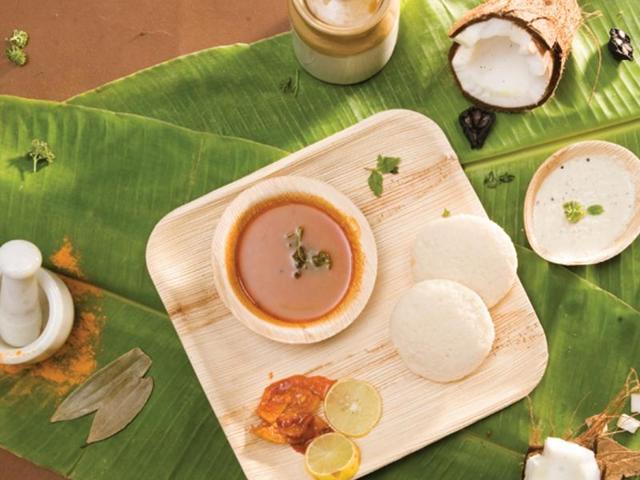Plain, sweet, spicy: Bowls made of leaves, forks and spoons you can eat
Biodegradable cutlery and crockery are catching on among cafes, caterers and in private kitchens, as people seek alternatives to plastic
When Madhur Saluja ordered biryani at a Bangalore café in December, he was surprised to find the cutlery that came with it was edible.

“It was actually really tasty,” says the 40-year-old IT manager, laughing.
The spoon he’d been served was jowar cutlery made by Hyderabad-based Narayan Peesapaty, a former scientist with the International Crop Research Institute for Semi-Arid Tropics (ICRISAT).
As a scientist, Peesapaty says, he had become increasingly concerned about the ease with which Indians used, and discarded, plastic spoons. “Plastic is a petroleum derivative and contains toxic chemicals,” he says. “It’s not just bad for the environment, it’s bad for us too.”
Peesapaty isn’t the only one stepping up. Amid growing concerns over global warming, mounting garbage and rising pollution levels, three companies have begun to offer edible or even biodegradable cutlery and even dinnerware over the past two years.
While Peesapaty’s Bakeys offers edible spoons, soup spoons, forks, sporks and chopsticks in three flavours — plain, sweet and spicy, 18-month-old Shunya Alternatives offers bowls, plates, meal trays and takeaway boxes made from wheat-straw and sugarcane fibre. And month-old Anahata founded by former copywriter Alok Banerjee, 28, makes dinnerware (including soup bowls, plates, and spoons) from areca leaves.

“We first thought of creating an alternative when we were at Mumbai’s Juhu beach three years ago and saw the waves of plastic and Styrofoam littering the sand,” says Yash Maniar, 24, who set up Shunya with his sister Sachi, 27, in Mumbai, incubating the idea at Germany’s Do School. “We picked wheat and sugarcane because both crops are grown across the country and we can use the chaff that otherwise goes to waste.”
Since areca leaf and the chaff have high heat-resistance, the products made by Shunya and Anahata are microwavable, in addition to being freezer-friendly and water-resistant.
Back to basics
The aim, say Peesapaty, Banerjee and the Maniars, is to steer people away from non-biodegradable options and back towards traditional alternatives that produce near-zero waste.
Bakeys, for instance, is a take on the Indian tradition of lifting food with a chapatti or a sukha puri. And Anahata draws on the leaf-based platters and pudis of coastal Maharashtra, Karnataka and Tamil Nadu.
Even if Saluja had wanted to throw away his spoon rather than eat it, for instance, he could have done so without any guilt, because it would have been devoured by insects, dog or birds, or —as with the products on offer by Anahata and Shunya — broken down into its natural components in a matter of days.
Scale and distribution are something all three companies are still working on. At Shunya and Anahata, the minimum order is 25 pieces, with prices per piece starting at Rs 80 and Rs 125 respectively.
Bakeys was launched in December 2013 offering limited delivery for bulk orders only, but scaled up in March and now has a minimum order of 100 pieces (which costs Rs 275) and delivers across India.

Already, in the last case, the benefits of scaling up are showing. Where Peesapathy had 20 clients before March, he has since had over 2,700 orders for cutlery worth Rs 5.5 lakh.
“We mortgaged our family house to fund the initiative,” says Peesapaty, whose operation consists of his wife and 10 workers. “But we knew it was an idea that would work, and we are now seeing interest from investors too.”
Meanwhile, as retail orders trickle in, the largest customer base for all three product lines is café and restaurant chains, wedding caterers, and event planners.

In Mumbai, for instance, the trendy Kala Ghoda Café is among Shunya’s 40 hospitality clients across 12 cities, including Mumbai, Delhi, Pune, Goa and Indore.
“We decided to turn fully organic in December and went looking for eco-friendly cutlery at various exhibitions,” says café manager Sayeed Shaikh. “That’s when Yash got in touch with us and we have since bought 1,000 forks and spoons and 500 takeaway containers from him every month. All our takeaway orders now feature Shunya.”
In Hyderabad, event management company Royal Treat Hospitality Services has used Bakeys cutlery at 20 events since April 2013.
“We’ve used the spoons and forks at weddings, cocktail parties and business conferences. I love the concept and so do my clients,” says Krishna Jakka, 52, owner of Real Treat.
Retail customers are snapping them up too, encouraged by their durability and uniqueness.
Read: SC worried over littered plastic ‘time bomb’
“I ordered 50 Anahata plates for my daughter’s birthday party on April 7 and I am amazed by how sturdy they are,” says Pallavi Ajmera, 38, a chartered accountant from Mumbai. “Friends at the party were asking where I got them.”
These are great initiatives and have the potential to reduce the use of plastic, says Chandra Bhushan, deputy director general at the independent Delhi-based thinktank Centre for Science and Environment. “Though there is pressure to reduce the use of plastic bags, not much is being done about plastic cutlery, whose use is growing at a phenomenal rate. We must do everything to reduce its use.”
Watch | Now, eat your food and the cutlery too
Catch your daily dose of Fashion, Health, Festivals, Travel, Relationship, Recipe and all the other Latest Lifestyle News on Hindustan Times Website and APPs.



